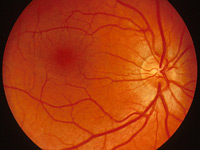Vision Science - VISNBH3962
Stream Summary
Faculty: SCI - Faculty of Science
School: School of Optometry and Vision Science
Contact: www.optometry.unsw.edu.au
Program: 3962 - Advanced Science (Honours)
Award(s):
Bachelor of Advanced Science (Honours)
View stream information for previous years
Stream Outline
Stream Structure
Students will also have the opportunity to:
- Use effective communication skills to present information in a convincing manner
- Show Strong information literacy skills by conducting an analytical literature review
- Work effectively to explore a research topic
- Conduct a thorough literature review
- Design and implement a research plan
- Collect and analyse data
- Present an oral presentation at a research seminar
- Write a scientific paper
Assessment
1) The Vaegan Memorial Seminar series and journal club attendance
Fortnightly research seminar presentations (1 hr) by postgraduate students, staff members and visiting academics. In addition weekly journal clubs are held by staff members in the school in which research articles are presented and informally reviewed. Students are required to present at journal club. No assessment is given, but 75% attendance for both components is required for successful completion of the honours program in the School of Optometry and Vision Science.
2) Tutorials or Workshops – 10% to the final honours grade
Fortnightly workshops (2-3hrs) which covers topics such as ethics, research design, statistics and data analysis, thesis writing and synthesis, presentation skills and professional development. Fornightly exercises (e.g., quizzes, problem based learning examples and case studies) will be given and students will be required to submit them for assessment.
3) Literature review and Research proposal – 20% to the final honours grade
The literature review will be marked by the supervisor based on:
- Demonstrated knowledge of topic area
- Content and organisation, coverage of key issues
- Depth and breath of analysis and discussion
Presentation of project results and conclusions. Assessed on scientific content and communication clarity and style
5) Written Research Report – 60% to the final honours grade
This report will be marked by two independent assessors in the school or elsewhere when expertise is needed. This assessment is based on:
- Depth and breadth of discussion
- Content of report, coverage of key issues
- Appropriate use of figures and tables
- Correctness and appropriate use of reference
- Organisation, clarity and format in appropriate scientific style
Honours Calculation
Hons. Class I (>85%)
Work of superior quality in all aspects of research, scientific writing, and oral presentation, demonstrating the ability to organise information in a clear and concise manner, the integration of information from a wide range of sources and containing clear examples of excellent critical evaluation.
Hons. Class II, Division I (75% to 84%)
Work of very good quality in all aspects of research , scientific writing and oral presentation, but showing lesser ability to organise information in a clear and concise manner, integrate information from a range of sources and critically evaluate the literature and research data.
Hons. Class II, Division 2 (64% to 74%)
Good quality in all aspects of research, scientific writing, and oral presentation, but with inadequacies in understanding, critical skills, organisation and presentation.
Hons. Class III (50% to 64%)
Adequate quality work with significant deficiencies in understanding, critical skills, organisation and presentation.
Admissions Requirement and Process
Students must enrol full-time in VISN4003 in two consecutive semesters of study. Students must make contact with potential supervisors and gain approval from the Honours Coordinator. Following this, students should contact student admissions and complete an honours application form before the due date (typically February for S1 and June for S2).
Pathways
Students graduating with honours in vision science are well suited to find employment in the vision science industry. Employment opportunities exist in a wide range of public and private sector areas that specialise in primary eye care, orthoptics, optical devices and technologies, teaching, and scientific research and development in the ophthalmic industry. Career opportunities are available in industrial and commercial businesses that focus on: The development and application of visual therapeutics – such as devices that correct refractive errors (e.g., contact lenses and spectacles), drug development, medical devices (e.g., ocular implants) and imaging; The entertainment industry – developing visual simulators, visual design and graphics, and video games; Government sectors – particularly in teaching, defence technology (e.g., lasers and optical equipment), and contributing to the development of health and occupational policies regarding the importance of vision to quality-of-life and in the workplace.










